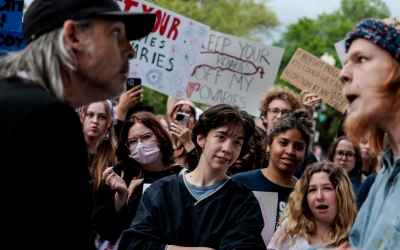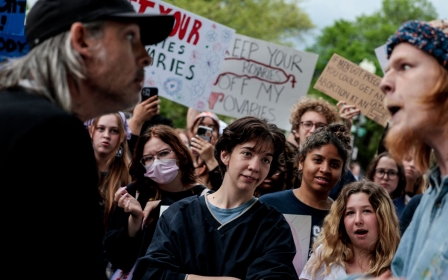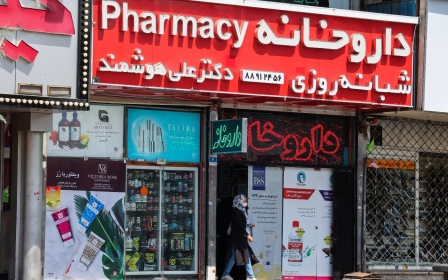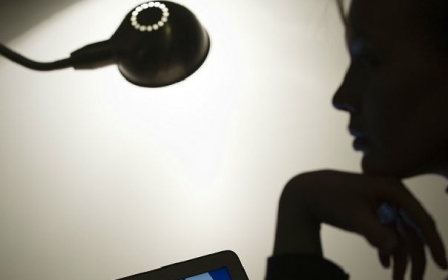Roe v Wade: Muslim women say overturning of decision will hurt everyone
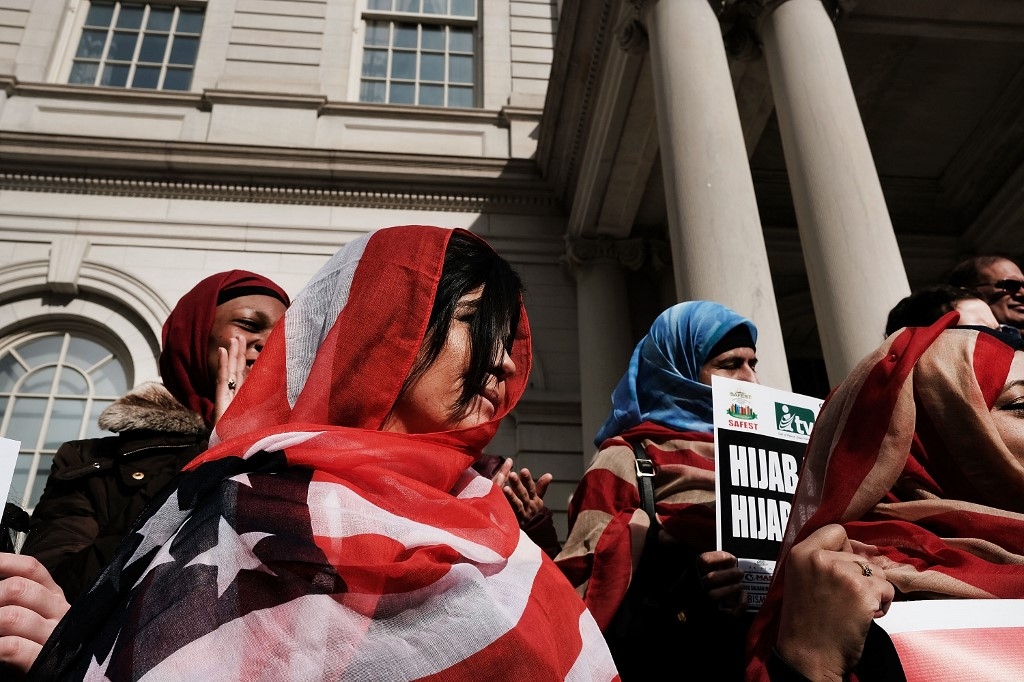
Fatima* remembers every painstaking detail as if it were yesterday.
Her parents had gone out for dinner and she stayed at home with her uncle. She was wearing purple pyjamas under her abaya. Her T-shirt had a small hole near the collar.
She had never imagined that someone in her family could betray her. In the few hours that her parents were gone, she was raped.
Fatima soon found out she was pregnant. Without the support of her immediate family, she left home and eventually met a woman at a mosque in Connecticut that offered to help. A week later, she had an abortion.
Speaking to Middle East Eye, she says she doesn't know how she would have coped if she had been forced to keep the baby. But now, women across the US might have to face that exact reality.
New MEE newsletter: Jerusalem Dispatch
Sign up to get the latest insights and analysis on Israel-Palestine, alongside Turkey Unpacked and other MEE newsletters
'[The overturning of Roe v Wade] is essentially state-sanctioned, state-imposed, gender-based violence to women'
- Kavita Mehra, Sakhi for South Asian Women
On Friday, the US Supreme Court eliminated the constitutional right to an abortion. The Court overturned Roe v Wade, a 1973 landmark decision which ruled that the constitution protects a pregnant woman's right to choose to have an abortion. Now, the question of abortion legality will be decided by each state.
It's a decision that will have an impact on Americans from all walks of life.
"I would consider myself a practising Muslim. I try my best to abide by the Quran and the Sunnah [teachings of the Prophet Muhammad]. Based on my faith, I know I did the right thing. I know it was ok for me to have an abortion. Islam gave me that right," Fatima said. "But now this country doesn’t recognise these rights. What will other women like me do?"
Fatima explained that she still would have ended her pregnancy, had abortion been outlawed ten years ago. She said she was affected both physically and mentally just by knowing she was carrying a child born out of rape.
"I think what these lawmakers don’t understand is that by overturning Roe v Wade, access to safe abortion will no longer exist. The keyword is 'safe.' Women will still get an abortion. We will find a way," she said. "Women like me who were sexually assaulted will get an abortion even if it actually kills us."
Islamophobic tropes
According to the majority of Sunni Muslim scholars, abortion is permitted for health reasons if it is carried out before 120 days. If there is an extreme danger to the mother or child, then the time period can be extended.
Asifa Quraishi-Landes, a legal scholar and professor at the University of Wisconsin-Madison, where she teaches Islamic law, says religious minorities within the US are feeling unseen. She says that women should be able to continue going to their imam or rabbi to make their own decisions rather than have to contend with state-imposed decisions.
"It is signalling that the state is aligning with one particular view within the Christian community and using the power of the state to impose that particular Christian view on everybody. And that should be a concern to any religious minority," she said.
Many have been referring to the Supreme Court's decision as being akin to "sharia". But according to Quraishi-Landes, apart from being an Islamophobic trope, the rhetoric also unnecessarily drags Muslims into the conversation over the Christian right's crackdown on LGBTQ and women's rights in America.
"The complaint is basically you're being theocratic. But instead of saying theocratic, they say: 'that's sharia', with the presumption that sharia insists that the state should impose moral religious values on everybody," she said.
"But if you look at the history of Muslims, that is actually not the case at all."
Denise Ziya Berte is the executive director of Peaceful Families Project, a non-profit organisation working toward preventing various types of abuse in Muslim families.
She explained how the overturning of Roe v Wade "makes the Christian standard of this idea of 'conception at birth' the law of the land" and that's not actually how Islamic law addresses the issue.
"The multitude of sort of issues around Roe v Wade and Muslim women, especially in the area of domestic violence, is mostly about power and control; having to follow a law that is not our law," she said.
"What domestic violence is, is a system of power and control. And when women are in most danger is when they have less power and control either socially, legally, or economically."
'I would do it again'
Kavita Mehra is the executive director for Sakhi for South Asian Women, a New York-based organisation that serves survivors of gender-based violence through direct service, advocacy, technical assistance, and community outreach.
She explained how there is a direct linkage between gender-based violence and the overturning of Roe v Wade.
"[The overturning of Roe v Wade] is essentially state-sanctioned, state-imposed, gender-based violence to women because essentially, it's preventing individuals from getting something or being able to fully utilise their bodies or have access to health care and have determination over their own bodies," she said.
"Survivors of gender-based violence have people stepping into how they control their bodies and their lives. And so this is very much pervasive. It's like a woman's body is no longer her own. It's being controlled by individuals who are inflicting some form of power onto them."
Sakhi has had many cases where survivors of domestic violence have reached out and wanted to have an abortion. In 2020, the organisation worked with 375 survivors. In 2021, the number went up to 450. Now, Mehra is expecting that number to increase even more.
"The decision to overturn Roe v Wade won't have an impact on survivors in New York City, but it will impact those across the country, especially in the 26 trigger states where Roe v Wade will be immediately overturned," she said.
There are 13 states with "trigger bans" that are designed to take effect as soon as the law is overturned, and in several other states where anti-abortion laws were blocked by the courts and now legislation will become active again.
For women like Fatima, hearing talk of abortion take over the news and politics is too much to bear. A decade after she went through her own, it doesn't get any easier.
"I pray no woman has to go through what I went through, what I am still going through. Women don't just have an abortion and go ahead with the rest of their day. It is not like that. We have an abortion and that sticks to us like glue for the rest of our lives. I didn't ask for any of this to happen to me. But I did and now I have to live with it," she said.
"Someone invaded my body and I stood up for myself, all by myself. And I would do it again with or without laws protecting me. And I can assure you that every woman would do the same."
Middle East Eye delivers independent and unrivalled coverage and analysis of the Middle East, North Africa and beyond. To learn more about republishing this content and the associated fees, please fill out this form. More about MEE can be found here.


